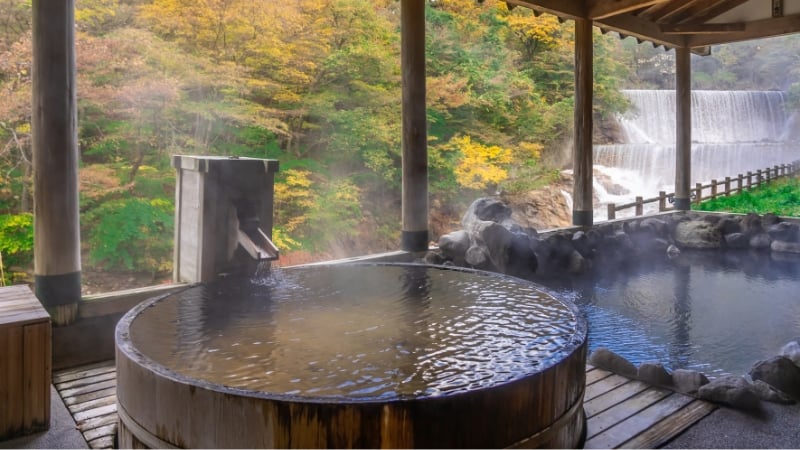If you’ve ever soaked in a Japanese onsen (hot spring), you know it’s more than just a relaxing bath. It’s a deeply embedded part of Japan’s culture – A tradition that goes back centuries, offering not only healing but also a sense of community and connection to nature. And now, there’s a push to have Japan‘s hot spring culture officially recognised by UNESCO as an intangible cultural heritage, just like the country’s own sake brewing and Finland’s sauna culture.
Also read: 12 Hot Spring Towns in Japan to Relax & Unwind on Vacation
The Push for UNESCO Recognition

Image credit: Pisitkhambubpha via Canva Pro
A group of Japanese governors has taken the reins in lobbying for onsen to join UNESCO’s prestigious list by 2028. They believe that the centuries-old practice of bathing in naturally heated mineral water is just as important to Japan’s cultural identity as other celebrated traditions, such as the making of sake and shochu spirits, which were added to the list in Dec 2024.
The group, led by Tottori Governor Shinji Hirai, formed in Nov 2022, and they’re serious about their mission. Representing 44 of Japan’s 47 prefectures, the group is working to compile a survey of onsen locations across the country. Their aim? To assess not only the current state of these hot spring areas but also to highlight the importance of protecting them as cultural heritage sites.
A Tradition Steeped in History

Image credit: Leung Cho Pan via Canva Pro
Japan is home to around 3,000 hot spring locations, from the well-known resorts like Hakone and Beppu to hidden gems in remote mountain towns. For many locals, a trip to the onsen is more than just a wellness retreat. It’s a way to unwind, bond with friends or family, and embrace Japan’s connection to nature.
In fact, the idea of onsen as a “lifestyle” is key to the governors’ push. If UNESCO recognises the culture, it would raise cultural awareness about the onsen custom around the world. Additionally, it would promote their preservation and revitalisation, helping to sustain these unique locations for future generations.
Inspiration from Finland’s Sauna Culture
The momentum behind the onsen campaign gained steam after UNESCO added Finland’s sauna culture to its list in 2020. The UNESCO committee hailed it as “an integral part of the lives of the majority of the Finnish population”. This helped raise the profile of other traditional bathing practices. The Japanese governors see this as a model for their own efforts. They believe onsen holds just as significant a place in the lives of the Japanese people.
Japan’s Growing Presence on the UNESCO List
It’s also worth noting that Japan already has several entries on UNESCO’s intangible heritage list. UNESCO added Japan‘s traditional sake-brewing methods to its list in Dec 2024, which would make it the nation’s 23rd listing. This history of recognition sets a hopeful precedent for the hot spring culture campaign.
The campaign to have onsen recognised by UNESCO will intensify as the 2028 deadline approaches. If successful, it could elevate Japan’s hot spring culture to an even higher status, attracting more visitors and ensuring these cherished traditions are preserved for generations to come.
Also read: 20 Reasons Why Travelling to Japan is a Complete Waste of Time
So, keep an eye on this initiative – It’s sure to heat up, and who knows? You might be soaking in an officially recognised UNESCO treasure on your next trip to Japan!




